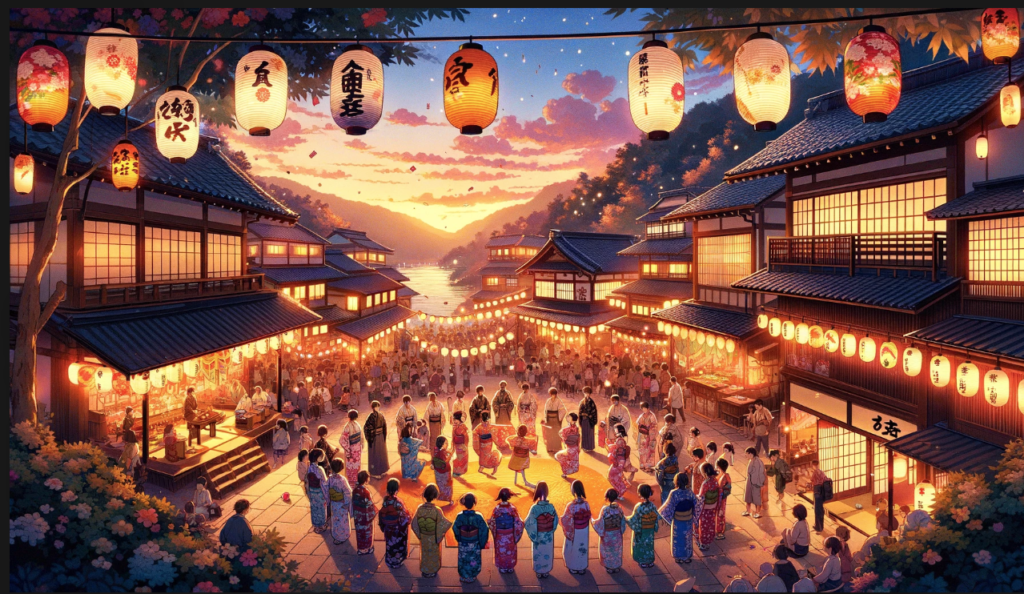
Lesson 40 Celebrating Obon
Topic Question: How do Japanese people celebrate Obon?
No. 1: Introduction– First, try answering the question yourself.
The instructor will provide advice on vocabulary, grammar, and expression corrections.
Sample Answer – Let’s read aloud. Instructor will check your pronunciation and accent.
Obon is a traditional Japanese festival that honors the spirits of ancestors. It is celebrated in mid-August, though the exact dates can vary depending on the region. The festival is marked by the return of ancestral spirits to the world of the living. Japanese people celebrate Obon by cleaning their homes and visiting family graves to make offerings. Lanterns are hung in front of houses to guide the spirits, and a special dance known as Bon-Odori is performed in many communities. The highlight for many is the floating of lanterns on rivers or the sea, symbolizing the ancestral spirits’ return to the world of the dead. This ritual, known as Toro Nagashi, is a poignant reminder of the transient nature of life. Obon is a time for family reunions, reflection on the sacrifices of ancestors, and the expression of gratitude for their contributions to the present generation’s well-being.
No. 2: Vocabulary Building- 5 Words to Learn and Their Meanings
Pronounce the Words Correctly (Pronunciation Training) + Make Sentences Using the Words Instantly
- Ancestors (先祖, senzo): Family members from past generations.
“During Obon, families pay respects to their ancestors, recognizing their continued importance in their lives.”
- Offerings (供え物, sonaemono): Items given as a sign of respect or worship.
“People prepare food and flower offerings for their ancestors during Obon.”
- Lanterns (提灯, chōchin): Light sources traditionally made from paper and bamboo.
“Lanterns are used to guide the spirits of the ancestors during Obon.”
- Bon-Odori (盆踊り): A traditional dance performed during the Obon festival.
“The Bon-Odori dance is a communal way to honor ancestors and celebrate their presence.”
- Transient (はかない, hakanai): Lasting only for a short time; impermanent.
“Toro Nagashi symbolizes the transient nature of life, with lanterns floating away in the water.”
No. 3: Key Idiom and Example Sentences
“Light the way” – This phrase means to guide or show direction, often used metaphorically to suggest providing guidance or enlightenment.
“Lanterns during Obon ‘light the way’ for the spirits of the ancestors, guiding them back to their earthly homes.”
“The teachings and virtues of our ancestors ‘light the way’ for living generations, guiding us through life’s challenges.”
No. 4: Discussion and Exchange of Opinions on the Sample Answer
Instructor: How do the various customs and rituals of Obon reflect the Japanese values of respect for the past and familial ties?
Student: [Opinions of students]
No. 5: Free Discussion on the Topic
Let’s explore the significance of Obon in contemporary Japanese society. How do modern Japanese people balance traditional Obon practices with the demands of contemporary life? Discuss how Obon celebrations might differ in urban and rural areas. Additionally, consider how the festival fosters a sense of community and continuity among Japanese people. How is the tradition of Obon evolving, and what might its future look like in Japan and among the Japanese diaspora around the world?







